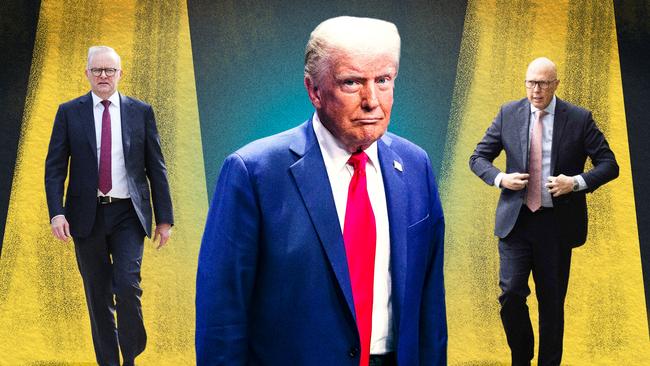
This is a diplomatic win for the Prime Minister – but strictly limited and preliminary. Albanese has no guarantee of success. His real win comes only if Trump agrees to exempt Australia, and that remains an extremely steep task. The hope arose when Trump confirmed he told Albanese that he would give “great consideration” to Australia’s exemption request.
His calling Albanese a “fine man” was typical Trump gloss, not to be vested with any significance, but probably enough to send the pro-Trump, anti-Albanese legions choking on their breakfast.
The warning delivered by Malcolm Turnbull about Australia’s efforts was timely: “If Trump has decided to impose a steel tariff on everybody, full stop, no exemptions, then it may not be possible to win one, no matter how eloquent you are.”
When Trump signed the executive order he said there were “no exemptions” – maximising his negotiating stance with any country that seeks exemptions. Typical. But Labor will take heart from the emphasis he placed on Australia being one of the few nations where the US enjoys a trade surplus – always a determinant for Trump. What it won’t like is the claim in the executive order that Australia’s aluminium imports to the US have broken an earlier deal.
While the Trump-Albanese discussion should not be exaggerated, an unsuccessful call – where Trump rebuffed Albanese – would have been disastrous. That would have been a humiliation for Albanese and an insult to Australia. The rebuff would have translated into election politics, harming Albanese and gifting the Coalition with the line it might have expected: that Albanese couldn’t deal with the President.
The political stakes are now high. By saying he will give consideration to an Australian exemption on tariffs, Trump has inevitably raised expectations. To subsequently dash them would deliver disappointment and damage to Australia and its government.
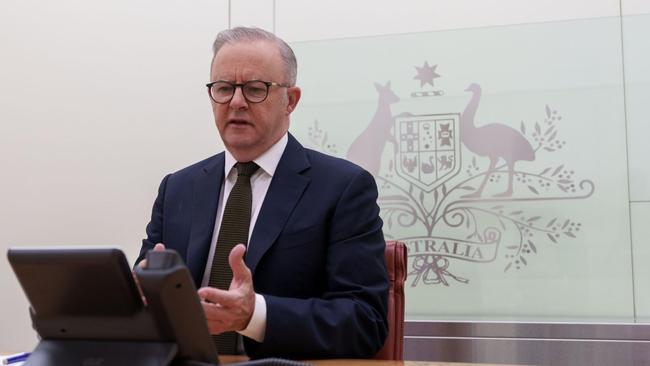
But Albanese doesn’t have much time. Trump’s announced 25 per cent tariffs on steel and aluminium imports to the US – paid by American importers, thereby lifting domestic prices – come into effect in early March. How realistic is it to think Trump will endorse an Australian exemption before then? Turnbull as prime minister won a Trump exemption on tariffs but only after a sustained campaign over a far longer period. And Trump is a far more resolute Tariff Man this term.
For Albanese, the issue is two-pronged – it is about Australia’s trade interest but also about Albanese’s authority as Prime Minister. The election inflates the stakes. For Albanese to be rejected by Trump on campaign eve would be a devastating blow and a free kick to the Coalition. Every sign is that Albanese is managing Trump as a professional. Their discussion revealed an Australian government that has been diligent in preparing its case on tariffs; witness the breadth of shared national interests the leaders canvassed.
On merit, Australia has a strong national interest case to put to Trump for exemptions, almost a unique case. No other nation has the same basket of US ties as Australia. This includes a significant two to one trade surplus on the US side; strong investment in the US economy now totalling $1.2 trillion; a longstanding security relationship now intensified by AUKUS; partnership on critical minerals; a remarkable agreement to provide $US3bn to help finance US submarine construction, a decision under AUKUS that predates Trump but fits into his mindset; and, significantly it seems, Albanese mentioning that Australia’s superannuation funds are now looking at further “significant” investments into the US. An intriguing issue is whether Labor will leverage super investments as part of a broader understanding with Trump.
Unsurprisingly, Albanese pledged on Tuesday that Australia would pursue its interests using “all of the human assets at our disposal”. Foreign Minister Penny Wong has already met her counterpart, Marco Rubio; Trade Minister Don Farrell is awaiting to meet his counterpart, Howard Lutnick, when confirmed; while Richard Marles at the weekend met his defence counterpart, Pete Hegseth, and handed over an $800m first instalment of our US submarine investment.
Think of the optics: Trump rejecting Albanese after pocketing our $800m. How would that play at home? The electoral politics are diabolical – if Albanese fails to persuade Trump, he will become the target of an election-induced outcry saying he’s not up to the job.
It would be an easy accusation, but false. Let’s identify the leader who wears the obvious and heavy blame for the chaos now unfolding – that’s Trump.
Trump is not just threatening Australia. More significantly, he is threatening the world. His latest trade declaration confirms Trump’s obsession with higher tariffs. Indeed, he boasts that more is to come, from cars to pharmaceuticals.
His frenzied protectionism is irrevocably tied in his mind to the re-industrialisation of the American heartland and the refinancing of the US Treasury, but the consequence is that it will raise US domestic prices, fan inflation, undermine US competitiveness, damage global trade and growth, weaken the US alliance system and give Beijing new opportunities across the globe.
The real harm for Australia is not the direct economic consequences but the multiple economic and strategic dangers unleashed.
You don’t blame Albanese for Trump’s deluded destructiveness.
What is coming is a test for Australia’s political class – but not just its political class. This goes to our corporate, economic, civic and media class as well. Free trade is fundamental to our national interest and needs to be defended – but if Australia, along with other nations, is undermined by a rising protectionism then we need the honesty and intellectual clarity to see who is responsible. That’s Trump, not Albanese.
Call Albanese to account for his many blunders, but don’t blame him for failing to manage Trump’s protectionism.
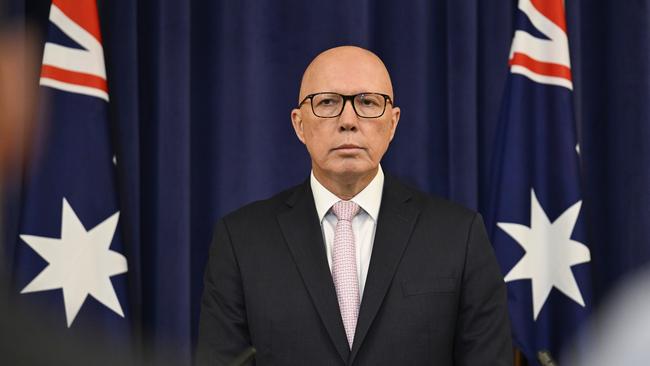
Trump is a transforming US President. The required response from Australia is rationality. Trump will do many bad things and many good things. Each must be judged on merit. His tariffs are one of the very bad things.
Beware people who are totally for Trump or totally against Trump – they are no help in Australia’s current challenge.
That means it’s time for the Coalition to put the cue in the rack. Since Trump’s election it has run a manic campaign convinced Albanese could never manage Trump, demanding that Albanese initiate a meeting, or rush to get Trump on the phone, insisting that Kevin Rudd couldn’t do the job and baiting the Trump administration to cancel him. It had one purpose – to undermine Albanese, but it came to the edge of undermining Australia.
The Coalition fell for its own propaganda. Bad mistake. It told us on Monday that Albanese faced his big test. On Tuesday after Albanese passed that opening test, the Coalition risked looking exposed and unpatriotic. Peter Dutton moved fast with a decisive, corrective message – he said the nation had a “bipartisan position”, that the Coalition stood with Labor in opposing the tariff and that Trump needed to know this.
But the Opposition Leader went further. He said if Trump persisted this “will damage the relationship between Australia and the United States”. Suddenly, the Coalition started to put the responsibility where it belongs – on Trump, not Albanese. Asked directly who would be to blame, Trump or Albanese, Dutton said: “It’s a decision of the Trump administration and I don’t think it’s warranted.” That is, Trump isn’t justified doing this.
Dutton is not walking away from criticising Albanese and Rudd for their past remarks about Trump. But the caravan has moved on. The issue goes to high-level statecraft – the trade, economic and strategic partnership between the nations.
The Coalition needs to be careful – getting caught between what is Australia’s national interest and the Coalition’s electoral interest.


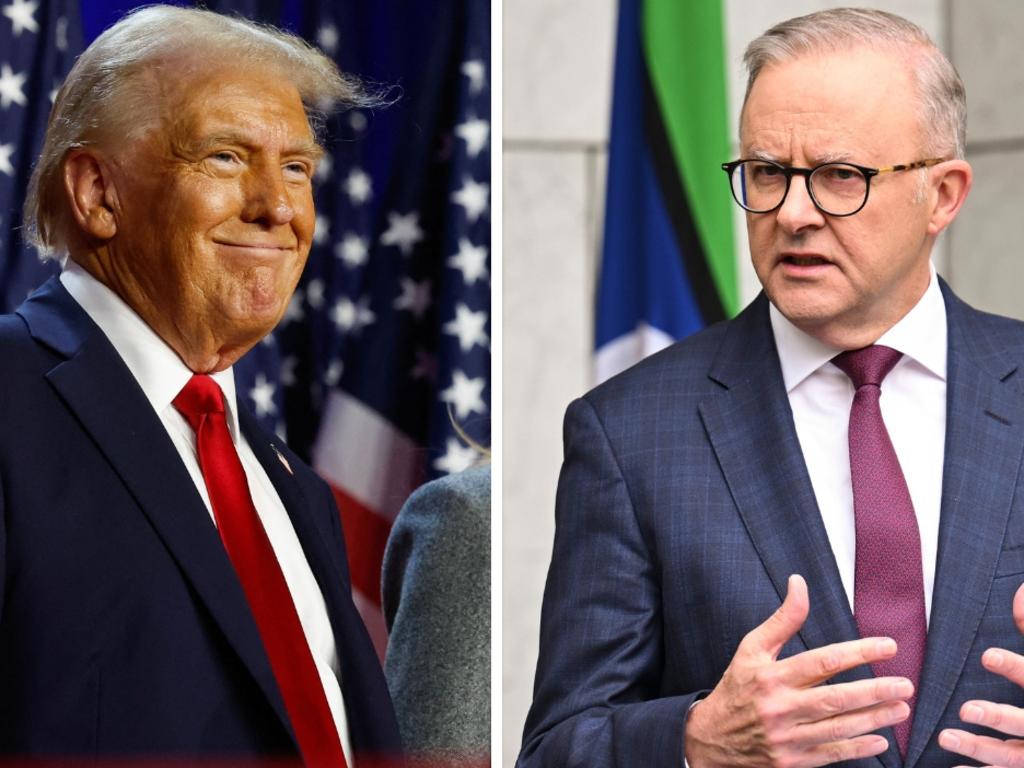

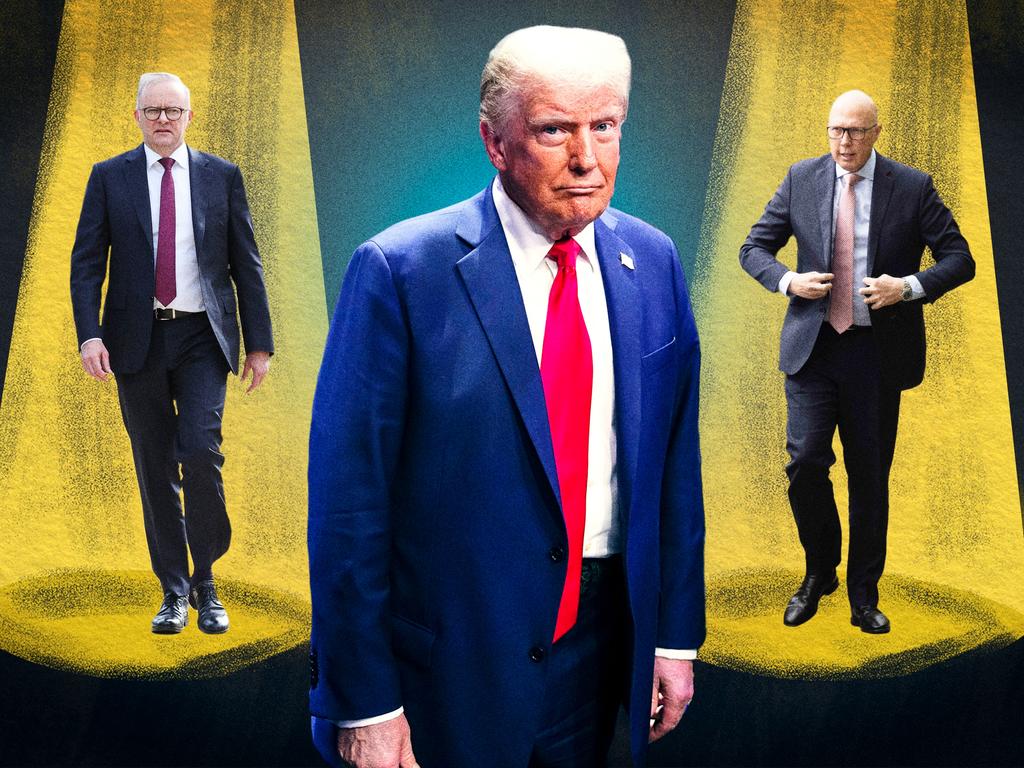


Anthony Albanese has passed merely the first hurdle in his relations with Donald Trump – they spoke for nearly 40 minutes, they got on, they canvassed trade and investment ties, and they agreed that Trump would consider an exemption for Australia from his universal steel and aluminium tariffs.